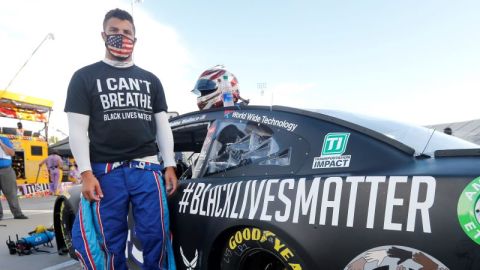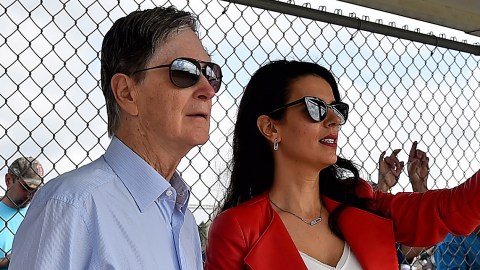 The most prominent impression Jason Collins gave off in Boston was that he was so disarmingly normal.
The most prominent impression Jason Collins gave off in Boston was that he was so disarmingly normal.
Reporters seldom had reason to interview Collins here — he played a total of 330 minutes with the Celtics — but in his stall by the door of the home locker room at TD Garden, Collins was almost always engaged in conversation with someone. He was too much of a “regular” guy, too uniquely self-aware for a professional athlete, for people to not gravitate toward.
In Collins’ introduction as a Celtic, the foul-prone big man joked that he had chosen No. 98 for his jersey so that referees would have to contort their hands to signal those two digits toward the scorer’s table. A few weeks later, while discussing his improved physical fitness with a reporter, Collins realized a scrum of media had developed around him and teasingly asked if they were all this fascinated with his diet. He was a millionaire with the ability to make cracks like your buddy at the bar.
That ability to joke about himself is rare in the ego-driven world of sports, and it showed through in his announcement Monday that he is gay. In becoming the first active male athlete in a major American professional sport to make his homosexuality public, Collins drew widespread support from fans, politicians and — most importantly of all — fellow players.
Beneath an obviously emotional decision, however, was a shrewdly reasoned approach that virtually absolves Collins of any criticism, save from the most hardened homophobes. Once again, his self-awareness shows through.
The first and most important factor is the man. If the focus becomes Collins’ sexuality, we may forget about the other qualities that made Collins such a widely liked and respected individual before the announcement — and such an ideal spokesman now.
In a statement released shortly after Sports Illustrated posted Collins’ story, Celtics coach Doc Rivers referenced Jackie Robinson, stating that teammates are always the first to accept the differences in one of their own. The lesson of Robinson’s story is not just that he excelled and broke down the modern color barrier in baseball, but that he came to be judged — positively and negatively — on more than his skin color.
By the end of his career, Robinson was described by teammates as a “great man,” not a “great black man” or a “great black ballplayer.” In the wake of Collins’ announcement, Rivers did not amend his opinion that Collins is “one of my favorite ‘team’ players I have ever coached” to “one of my favorite gay ‘team’ players I have ever coached.” Collins’ coming out, while historic, is just one part of who he is, for better or worse.
Collins essentially said the same himself, much more simply and eloquently. “I don’t let my race define me any more than I want my sexual orientation to. I don’t want to be labeled, and I can’t let someone else’s label define me.” So why come out at all? Because he wanted the decision to be his, “not TMZ’s.”
The second factor is the timing. Collins’ team, the Wizards, have wrapped up their season. The playoffs are proceeding without them for the fifth straight year. He does not have any teammates to potentially “distract,” to use one of the subversive buzzwords. The only thing they might be distracted from is their PlayStation games or lensless glasses shopping. With Collins on the roster, Wizards point guard John Wall coincidentally improved by leaps and bounds late in the season. If that were to change simply because Wall, or any player, suddenly was aware Collins was gay, then they have bigger problems beyond bigotry.
Additionally, Collins is a free agent. If he were under contract, there might be claims that he was putting his organization in an awkward position. The NBA and several teams have added their vocal support to the LGBT movement, but Collins’ coming out while under contract could force a team’s public relations department to work overtime. As a free agent, Collins has no employer to compromise. Some team gets to choose whether it wants the “distraction” and whether it feels capable of managing that. Again, if a team cannot, then they have deeper, organizational issues to address.
The longstanding fear is that a few of his new teammates will turn the cold shoulder, and that may be true. If so, they will find themselves outside the mainstream of their peers. Quickly, the standard-bearers among players, from Kobe Bryant to Jason Kidd, offered their support via Twitter. If Kobe says it’s OK, the rest of the league had better step in line or incur his wrath.
The third and final factor is Collins’ style. If you grew up in the 1980s and ’90s like me, you know gay people as the flamboyant caricatures they were on sitcoms. They are, and some still on current TV shows are, the antithesis of Collins. In an era when fashionistas like Rajon Rondo and Russell Westbrook seem to discover a new shade of pastel every week, Collins is anything but flashy. He is a bruiser, a screen-setter and a hack artist. He does all the dirty work many straight players shy away from. No misguided stereotype for softness applies.
Wherever Collins lands next season, it will be tough for anyone to root against him. He will have many new fans, of course, and maybe a few of his old ones will turn away. Most of his teammates and opponents will continue to respect him, though, as they did back when they routinely confused him with his twin brother, Jarron Collins.
When Collins takes the court, he promises to play the same way as ever. He may even deliver an especially hard screen to an intolerant opponent. He will be just as engaging as ever, only now he will be on the record, discussing an important topic of social significance, not just joking around with whoever happens to be hanging out near his locker.
Perhaps someone should have recognized well before that there was something different about Collins beyond his affability. He disclosed in SI that wearing No. 98 was not actually to tweak the officials, but a nod to the torture and killing of Matthew Shepard, a gay college student, in 1998. It was an understated, personal gesture, done without excessive fanfare, and it may have been a clue into how Collins is handling this latest move. Now, his actions are more public, but true to form, he clearly is still going to great lengths to make sure he does it the right way.
Have a question for Ben Watanabe? Send it to him via Twitter at @BenjeeBallgame or send it here.



